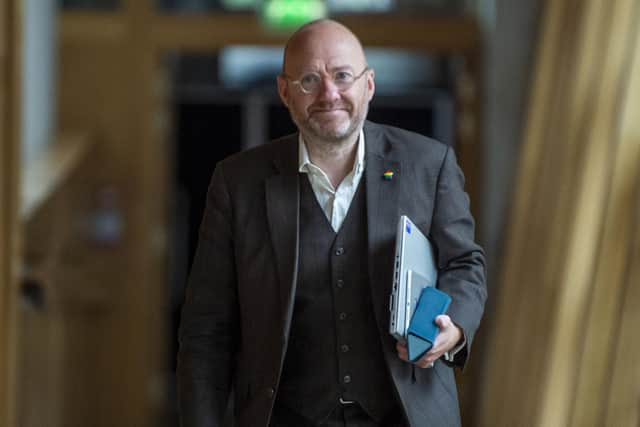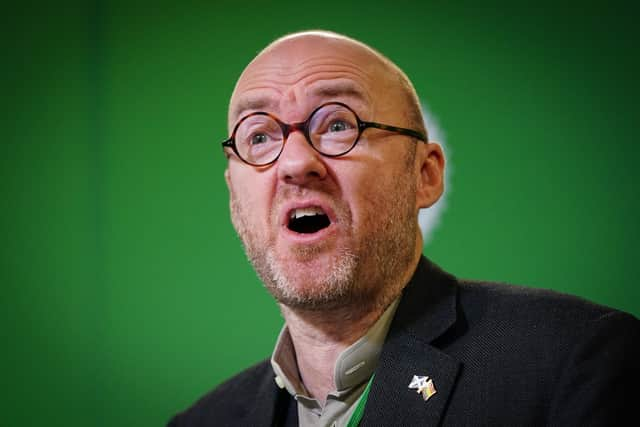Patrick Harvie: Westminster’s ‘deliberate’ dragging of climate into culture war could cause ‘immense harm’ and hamper Scotland’s climate action
Scotland’s minister for zero carbon buildings has denied that the Scottish Government is rowing back on plans which will require householders to replace oil and gas boilers with green energy systems.
Speaking exclusively to Scotland on Sunday ahead of the launch of a public consultation on heating, Patrick Harvie said press reports suggesting that targets were being abandoned were untrue and part of a wider political campaign aimed at undermining environmental action and stoking fear.
Advertisement
Hide AdAdvertisement
Hide Ad“There are some people, right from the publication of the Heat in Buildings strategy and the early work on this a couple of years ago, there have been some people who've always tried to misrepresent what we were proposing to do,” the Scottish Greens co-leader said.
“I've had certain people in here saying, ‘Patrick Harvie wants to rip out your gas boiler by 2025’. That has never been the proposal.
“The proposal has always been to get the legislation in place in 2025, and to get regulations in place from that, but the regulations would then set a progressive series of steps toward the elimination of fossil fuels from heating by 2045.
“The backstop is always 2045, as that’s when we need to be substantively transitioned away from polluting heating systems.”
Homes and workplaces account for around a fifth of Scotland’s total greenhouse gas emissions.


The Scottish government published its Heat in Buildings Strategy in 2021, setting out aims for increasing energy-efficiency in homes and moving away from fossil fuel heating to cut the environmental impacts and costs of keeping buildings warm.
It is a key element of the Bute House Agreement, the power-sharing deal between the SNP and Scottish Greens.
Announcing the strategy at the time, Mr Harvie stated the government’s “commitment to phasing out the need to install new or replacement fossil fuel boilers in off-gas properties from 2025, and in on-gas areas from 2030”.


Advertisement
Hide AdAdvertisement
Hide AdThe consultation, due to be published on Tuesday, will seek views on a range of proposals.
It’s expected these will include two main aims from the 2021 strategy – for all homes to reach a good level of energy-efficiency by 2033 “where feasible and cost-effective” and “almost all homes” to be warmed by eco-friendly heating systems by the net-zero deadline of 2045, with interim targets along the way.
Fossil-fuelled boilers will be outlawed in new-build properties from April 2024 after regulations were passed at Holyrood this year.
He said 2025 “was never proposed as the date when people have to rip out their gas boilers – that has just never been the case”.
“It is still the expectation that 2025 is when we will pass the bill,” he said. “It’s the date to get the legislation passed, to get the regulations passed and to begin that phased transition away from [fossil fuel] heating, but it was never suggested as the end date.”
Mr Harvie, who was this week named Green Champion in the Scottish Politician of the Year Awards, in recognition of his efforts to decarbonise heating, criticised recent “backsliding” moves on green initiatives by the Conservatives at Westminster – including delaying the end date for sales of petrol and diesel cars, scrapping home energy-efficiency measures in the rental sector and pushing back a ban on new gas boilers – which he says are stoking mistrust and hampering climate action both in Scotland and across the nation.
“The UK government has essentially, and quite deliberately, dragged climate into what is generally loosely called culture war territory,” he said.
“If those kind of forces on the right and far-right continue to pursue that agenda, continue to misrepresent the proposition here, continue to undermine public confidence in the transitions, they will do immense harm – they will do immense harm in terms of our emissions, immense harm in terms of the opportunity cost for the jobs and the economic benefit Scotland could gain from this, and they will do immense harm in terms of public trust. So I would challenge any politician in any part of the public spectrum who has ever voted for any climate target, let’s work together. Let’s make sure that we are committed, not just to setting targets but to delivering them.
Advertisement
Hide AdAdvertisement
Hide Ad“We have done a lot of the easy stuff. Scotland has made really good progress, halving our emissions over the decades.
“We’ve got a lot of the hard stuff to do now and we need to make it achievable for people, we need to make it beneficial for people and we need to make sure we are liberating people from dependence on fossil fuels.
“We can do that but we are going to need the acknowledgement from right across the political spectrum that this is far too important to play opportunistic games with, misrepresenting government policy or scaring householders and communities.
“We need to be seizing the opportunity and developing what I believe we can – which is an energy system that works for people and the planet.”
The consultation comes along with two new reports from the Green Heat Finance Task Force.
The first, released last week, sets out opportunities and barriers to paying for the transition to climate-friendly heating, while the second, coming in a few months, will focus on place-based and community-scale solutions.
Mr Harvie says the new Heat in Buildings Bill and greener living will bring multiple benefits, including cheaper household bills.
“We’re going to continue to roll out the regulations on energy-efficiency, as well as giving people the financial support that they need through grants and loans in order to make those changes to their homes,” he said.
Advertisement
Hide AdAdvertisement
Hide Ad“This is a chance to liberate people from dependence on fossil fuels and the volatile prices associated with them, to have homes that are healthy as well as affordable for people to live in, and to reduce people’s energy costs.
“We can do this in a way that generates high-quality job and reduces fuel poverty, as well as tackling those critically important carbon emissions. And if we didn’t do that, I think we would be missing a trick.
“The transition is not just urgent, it is a huge opportunity for a better society.”
“Scotland is serious about getting this done.”
Comments
Want to join the conversation? Please or to comment on this article.